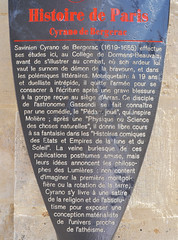Cyrano de Bergerac
Commemorated on 1 plaque
Cyrano de Bergerac. Savinien Cyrano de Bergerac (1619-1655) effectue ses études ici, au Collège de Dormans-Beauvais, avant de s'illustrer au combat, où son ardeur lui vaut le surnom de démon de la bravoure, et dans les polémiques littéraires. Mousquetaire à 19 ans et duelliste intrépide, il quitte l'armée pour se consacrer à l'écriture après une grave blessure à la gorge reçue au siège d'Arras. Ce disciple de l'astronome Gassendi se fait connaître par une comédie, le Pédant joué", qui inspire Molière; après une "Physique ou Science des choses naturelles", il donne libre cours à sa fantaisie dans les "Histoires comiques des Etats et Empires de la lune et du Soleil." La veine burlesque de ces publications posthumes amuse, mais leurs idées annoncent les philosophes des Lumières: non content d'imaginer la première montgolfière ou la rotation de la terre, Cyrano s'y livre à une satire de la religion et de l'absolutisme pour exposer une conception matérialiste de l'univers proche de l'athéisme.
English translation: Cyrano de Bergerac. Savinien Cyrano de Bergerac (1619-1655) studied here at the Collège de Dormans-Beauvais before showing up in combat, where his ardour earned him the nickname of the demon of bravery, and in literary controversy. A 19-year-old musketeer and fearless duelist, he left the army to devote himself to writing after a serious throat injury received at the siege of Arras. This disciple of astronomer Gassendi is known by a comedy, the Pédant Played, which inspires Molière; after a “Physics or Science of Natural Things”, he gives free rein to his fantasy in the “Comic Stories of States and Empires of the Moon and the Sun.” The burlesque vein of these posthumous publications amuses, but their ideas announce the philosophers of the Enlightenment: not content to imagine the first balloon or the rotation of the earth, Cyrano engages in a satire of religion and absolutism to expose a materialist conception of the universe close to atheism. [AWS Translate]
9 rue Jean de Beauvais, Paris, France where they studied

